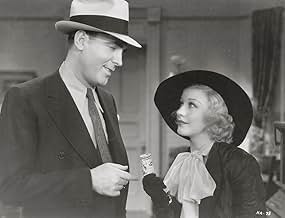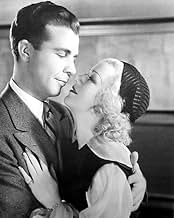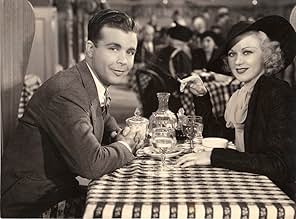Aggiungi una trama nella tua linguaUnscrupulous agent Rush makes singing waiter Clayton a big radio star while Peggy, who has lost her own radio show, helps Clayton.Unscrupulous agent Rush makes singing waiter Clayton a big radio star while Peggy, who has lost her own radio show, helps Clayton.Unscrupulous agent Rush makes singing waiter Clayton a big radio star while Peggy, who has lost her own radio show, helps Clayton.
- Regia
- Sceneggiatura
- Star
- Premi
- 1 vittoria in totale
- The Mills Brothers
- (as The Four Mills Bros.)
- Ted Rio Rita and His Orchestra
- (as Ted Fio Rito and His Band)
- Herbert Brokman
- (as Joseph Cawthorne)
- Three Mimics
- (as The Three Radio Rogues)
- One of the Three Radio Rogues
- (as Jim Hollingwood)
Recensioni in evidenza
Modern audiences won't be very taken by what passes as the comedy in "Twenty Million Sweethearts." Most fans from the mid-20th century on didn't care much either for the fast-talking, bombastic personas such as Pat O'Brien sometimes played, as he does here. That was something that apparently enjoyed a short stint of popularity in early sound pictures, but quickly died out within a few years. O'Brien's Rush Blake is as much a cad as he is a good guy, and while his boisterous character is just tolerable, his last tirade toward the end of the film is way overboard. It's not only unnecessary, but it would have improved the film to have left that on the cutting room floor. The only real comedy is in the short scenes with Allen Jenkins who plays Pete, host of a children's afternoon radio show.
But for most of this movie, audiences are in for a treat, seeing the singing that was popular at that time. Dick Powell had a very good tenor voice, and he plays a very likeable Buddy Clayton. And opposite him is a very young Ginger Rogers as Peggy Cornell, who shows that she could sing a nice tune. And, another special reason for seeing and enjoying this film is the Mills Brothers. This was just the second of a dozen films the famous singing foursome would be in. This is in their early years with some of the humorous tunes they sang then. By the 1940s, they would skyrocket on the music charts with many hit tunes over three decades. Performing until the early 1970s, the Mills Brothers would record more than 2,000 songs that sold more than 50 million records.
No other artists or groups could sing their top hits tunes as well, and no others even tried to record some of their best tunes. The lasting talent and quality of the Mills Brothers is proven as some of their top tunes are still heard on radio music programs and in occasional modern films. Once one heard these songs, they'd be remembered forever as sung by the Mills Brothers - "Paper Doll" of 1943, "St. Louis Blues" of 1944, "You Always Hurt the One You Love" of 1944, "Glow-Worm" of 1952, "Memory Lane" of 1956, "Say Si Si" of 1964, "Dream a Little Dream of Me" of 1968, and "Dream" of 1969.
This is a movie to enjoy the old-fashioned type of stage shows, the heyday of radio entertainment, and a look at top and upcoming musical talents of the time.
The best humorous line in the fine was by Pete, when actor Jenkins says, "I hate kids. I think every child should be born at the age of 20. Maybe they'd have some sense."
The story begins in Los Angeles where Russell "Rush" Blake (Pat O'Brien), a smooth talking talent scout for Consolidated Broadcasting, with a reputation of discovering such great entertainers as Russ Columbo and Bing Crosby, is dining at Perry's Brass Rail, a beer garden, where he comes across Buddy Clayton (Dick Powell), a singing water. After getting Clayton fired from his job, Rush makes amends by getting him to return to New York City with him on the promise of a singing career on the radio. As Rush is making arrangements for an audition, Clayton strolls through the radio station and encounters Peggy Cornell (Ginger Rogers), the "Cinderella Girl," who takes an instant dislike towards him for making funny faces on the glass window as she is trying to sing. Later, Clayton goes on with his audition, but fails, thus, no contract negotiations. With the help of Peggy, who now likes him, she succeeds into getting Clayton a second chance when it is realized that Clayton could put it over better with love songs. He goes on the air and becomes a success. With Buddy and Peggy now in love, it is up to Rush to prevent the couple from getting married so that Clayton can go on with his successful radio career, which then causes plenty of problems.
With music and lyrics by Harry Warren and Al Dubin, the songs featured include: "The Man on the Flying Trapeze" (traditional circus song sung by Dick Powell); "The Last Wind-Up" (sung by Eddie Foster, Billy Snyder, Matt Brooks and Morris Goldman); "Yes, I Heard" (sung by The Mills Brothers); "Out for No Good" (sung by Ginger Rogers); "How Am I Doing?" (The Mills Brothers); "The Man on the Flying Trapeze" (reprise by Powell); "I'll String Along With You," "I'll String Along With You" (reprise, both sung by Powell); "Fair and Warmer" (Powell); "Out for No Good" (Powell and The Mills Brothers); "Fair and Warmer" (instrumental by Ted Fio Rito and his Orchestra); "What Are Your Intentions?" (sung by The Debutantes and Ted Fio Rito); "I'll String Along With You" (Powell and Rogers) and "I'll String Along With You" (reprise by Powell). In the very opening of the movie, the camera focuses on various radio sets with the Three Radio Rogues, given screen credit for their unseen but heard performance, musically and comically doing their imitations of then popular radio stars of the day including Ben Bernie, Kate Smith, Arthur Tracy, Rudy Vallee, Amos and Andy, Joe Penner, Morton Downey and Bing Crosby.
"Twenty Million Sweethearts" is Warner Brothers answer to Paramount's radio musical satire, "The Big Broadcast" (1932), which also presented The Mills Brothers in song numbers, but didn't have the silliness that Paramount presented. "Sweethearts," a promotional showcase for Dick Powell, who was by then riding high in popularity in screen musicals, starts off well and funny, becomes mediocre somewhere in the middle but picks up again near the end. Although successful with its 1934 audiences, Warners reworked the plot element of "Sweethearts" again the following year with "Broadway Gondolier" (1935), with Joan Blondell, and using the same radio personalities as Ted Fio Rito and The Mills Brothers once more. Of the two, "Sweethearts" is better because of the chemistry between Powell and Rogers. The two had earlier appeared in two classic backstagers, "42nd Street" and "Gold Diggers of 1933" (both 1933), with Powell romancing Ruby Keeler, and Rogers in the supporting category as a wisecracking chorus girl. This time she not only keeps up with the wisecracks, but is elevated to Powell's co-star and succeeds as both singer and actress. Rogers would soon prove herself star material after becoming Fred Astaire's co-star and dancing partner in a series of successful musicals for RKO Radio throughout most of the Depression '30s.
The supporting cast of "Sweethearts" consists of character actors as the heavily accented Joseph Cawthorn; the hot-tempered but sophisticated Grant Mitchell; the simple-minded Henry O'Neill; the raspy-voiced Allen Jenkins as the star of a kiddie program; and everybody's male secretary, Johnny Arthur.
Portions of "Twenty Million Sweethearts" were reworked again by Warners with its Technicolor production of "My Dream is Yours" (1949) starring Jack Carson in the role originated by O'Brien, with Doris Day as the vocalist. The remake even includes the old tune of "I'll String Along With You," which, in spite of several reprises in the original, remains one of the best songs ever written for the musical screen.
"Twenty Million Sweethearts" is not available on video cassette at present, but can be seen on Turner Classic Movies. The movie is of sole interest not only to Powell and Rogers fans, but to those curious about the atmosphere of the world of radio broadcasting way back when. (***1/2)
Pat O'Brien has one of his wheeler-dealer roles as Russell Blake, an agent who's not delivering the great talent he's promised his boss but keeps getting pay advances nonetheless. Finally he's fired. However, at a restaurant, he hears a singing waiter, Buddy Clayton (Dick Powell) do a goofy "The Man on the Flying Trapeze" and brings him to the attention of the radio station. Reluctantly, his boss (Joseph Cawthorne) gives Buddy an audition - and is immediately sorry. Admittedly it's hard to hear Buddy's real voice singing the Flying Trapeze song.
Eventually, however, everyone hears Buddy sing and a radio show sponsor wants him. The current singer, Peggy Cornell (Ginger Rogers) clicks with Buddy, which makes for complications.
The score by Dubin and Warren is very good, as well as other songs, and there are performances by the Mills Brothers, bandleader Ted Fio Rito, Ginger Rogers, and The Radio Rogues.
The versatile Dick Powell had a beautiful tenor voice, showcased here, and Rogers is delightful. They made a cute couple. Besides his in front of the camera talent, Powell was a very astute businessman and had a keen eye for talent himself. During his career, he acted, produced, directed, and was responsible for giving Aaron Spelling and Sam Peckinpah their starts. Rogers of course would go on to do her films with Astaire.
Fun film, some good music, loved the cast.
This is a fine musical. The story is fine. I wish it has a better meet-cute. The stars are fine. Their singing is fine although their songs are not my taste especially the big song. What I really like is watching The Mills Brothers. Maybe I've seen them before. I don't know anything about them. Today, they would be a novelty act. That's why I like them. Nobody does that anymore and it feels fresh.
Lo sapevi?
- QuizScreenwriter Julius J. Epstein first arrived in Hollywood about 10:30 p.m. on October 14, 1933 and by midnight was collaborating on the screenplay of Universo innamorato (1934) as pages had to be turned in early Monday morning.
- BlooperAt about the one-hour mark Buddy Clayton (Dick Powell) is in a hotel room chatting with Pete (Allen Jenkins). As Powell reaches, his vest buttons itself.
- Citazioni
Pete: Well, I've put all the kiddies east of the Mississippi to bed. How's rehearsal?
Peggy Cornell: Oh awful. Some yokel stood outside the rehearsal hall making and stared at me until I nearly broke me up. What have you got a summons?
Pete: No, fan mail.
Peggy Cornell: Oh. Three of them. That's two more than last week! Your public are growing up and learning to write.
Pete: Listen to this: Dear Uncle Pete. I am well. How are you? I hear you on the radio every night. Great stuff for a he man poet... Have you heard my last poem, Peggy?
Peggy Cornell: I sure hope so.
Pete: Frankie Wallace was a pug. He laid his opponents out like a rug. Until one day... Wait a minute! You haven't heard the last of it.
Peggy Cornell: Well. You've got me cornered.
Pete: Frankie Wallace was a pug. He laid his opponents out like a rug...
- ConnessioniFeatured in Conoscenza carnale (1971)
- Colonne sonoreThe Last Round-Up
(1933) (uncredited)
Written by Billy Hill
Sung with modified lyrics by Eddie Foster, Billy Snyder, Matt Brooks and Morris Goldman
I più visti
Dettagli
- Data di uscita
- Paese di origine
- Lingua
- Celebre anche come
- Twenty Million Sweethearts
- Luoghi delle riprese
- Azienda produttrice
- Vedi altri crediti dell’azienda su IMDbPro
- Tempo di esecuzione
- 1h 29min(89 min)
- Colore
- Mix di suoni
- Proporzioni
- 1.37 : 1




















